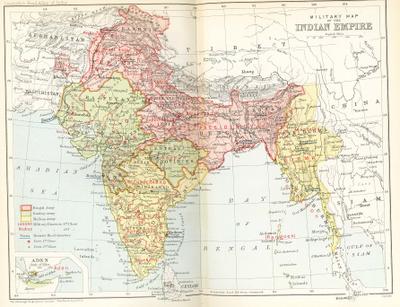

This is tall talk, but I believe India will also have to follow my lead. The Maoist insurgency is a huge reality in Nepal, and it is also a large, growing reality in India. What is my lead? My lead is to realize democracy itself will have to be redesigned, it will have to be reinvented. Democracy as it got copied from Britain five decades back is inherently inadequate. The elections and the parliaments do not seem to empower those utterly poor. The grinding poverty never seems to go away. There seems to be no way out. The gun ends up having appeal, almost like a safety valve for the down and out. Like Mahatma Gandhi said, if it is between the oppressed doing nothing and getting violent, I would rather they opted for violent protests. The utterly powerless are speaking. We need to opt to listen to them as opposed to pouring all our resources into silencing them. We need to channel their energy into peaceful ways by engaging them in a respectful dialogue that leads to a respectable, just solution.
I would not be surprised that the Indian and the Nepali Maoists talk to each other, any more than I was surprised some Indian leaders showed up for the Nepali Congress convention in Kathmandu recently, any more than anyone should be surprised I am affiliated with the Democratic Party here in New York City. Like minded dwell together. There is no news there.
The Maoists are either outlaws who need to be militarily crushed. And a military strategy has to emerge. Or they are symptoms of genuine political, social and economic conundrums. I believe the later is the case.
There has to be a political solution to the Maoist insurgency in both Nepal and India. And that solution is to introduce a total, transparent democracy. Democracy has to be about one person, one vote, one voice. Parties will have to become state funded based on how many votes they can earn. Primary health care and secondary education will have to become universal and free.
I encourage the Indian authorities to take a look at this: Proposed Constitution.
This is an interesting twist. When Mao tried his best to make inroads into the subcontinent, he failed miserably. Now he is making inroads and the Chinese authorities are embarassed: "They are giving our great leader a bad name!"
In The News
- India considering steps to crack down on Maoists Reuters ... reports that they were linking up with guerrillas in neighbouring Nepal. .... the nine Indian states where Maoist rebels are active. A common strategy will be drawn up ...... states, which stretch across the center of the subcontinent, are looking for satellite technology, elite troops and sophisticated arms ...... about 9,300 Maoist rebels in the country ..... The rebels have killed politicians, policemen and government officials, bombed factories and government offices and attacked buses and trains in an insurgency that stretches back to 1968. Thousands have been killed....... Officials say rebels in Nepal and India are known to be helping each other with arms and training and the two groups this month announced they would join hands....... The high-level government meeting comes within two weeks of the Maoists killing 39 people, including 23 policemen, in two separate attacks in central and eastern India....... track guerrilla hideouts through satellite imaging ....... "We also want the army's counter insurgency-trained soldiers" ........ need funds to buy bullet-proof jackets, modern rifles and to launch anti-poverty schemes in Maoist strongholds....... already using helicopters and satellites to trace rebel hideouts, but needed small unmanned aircraft and more federal forces....... So far, Indian states have been divided in their fight against the Maoists and have even blamed each other after rebels have struck in one state and fled to another.......
- Nepal Maoists taking advantage of India-Nepal cold war over ... India Daily, NJ
- The course of Naxalism PeaceJournalism.com, Nepal the abject failures of the Indian state.....After an experiment with a ceasefire and abrogated talks, the ban on the Communist Party of India-Maoists was reimposed by the government of Andhra Pradesh on 17 August.The attackers arrived on motorcycles and showered bullets at a public function...... the Centre has been closely coordinating anti-Naxalite operations throughout the country.... The Hyderabad government's ban order under the AP Public Security Act of 1992 listed seven mass organisations of workers, peasants, youth, students and writers associated with the Maoist party. They include the Radical Youth League (RYL), the Radical Students Union (RSU), the All India Revolutionary Students Federation (AIRSF), the Rythu Coolie Sangham (agricultural workers' organisation), the Singareni Karmika Sangham (a powerful trade union in the collieries), the Viplava Karmika Sangham (another trade union), and the Revolutionary Writers Association popularly known by its Telugu acronym Virasam. More than the ban on the parent party, it is the outlawing of the mass programmes of these affiliate organisations which will have serious repercussions on the ground. These groups have widespread membership, with regular programmes and publications. ....... Every time the police killed some important Maoist leader, the rebels have declared their intention to take revenge...... the current ban represents the start of a new phase in the confrontation between the Naxalite movement and the Indian state. The outlawing came after the chances of resumption of peace talks had effectively disappeared, and the police had intensified its operations to kill Maoist leaders and cadre, and to capture or harass sympathisers. The Maoists, too, had resumed retaliatory action of kidnappings and killings......A 30 July 2005 meeting of the chief ministers and the directors generals of police from the nine Naxalite-impacted states agreed to set up a task force to launch joint operations. A policy of "zero tolerance" towards the Maoists was announced. The Tamil Nadu government had already banned the Maoist Party on 12 July, and the Karnataka government had also earlier launched joint operations with the Andhra police....... the hope was that the authorities may at long last look to address the root causes of the rebellion......would adopt a political approach to the Maoists rather than treat them merely as perpetrators of terrorist violence..... would adopt a political approach to the Maoists rather than treat them merely as perpetrators of terrorist violence...... the Maoist movement revolves around the issues of agrarian transformation, especially the problems of the landless and the small peasants...... It was the peasant resistance to landlords in Naxalbari in West Bengal in May 1967 under the land-to-the-tiller slogan that provided a name to the Maoist phenomenon in Indian politics – Naxalism. The movement underwent much churning in the succeeding decades, organisationally and politically, but the focus on agrarian revolution has remained at the core. The very fact that land reform as a state objective has disappeared from Indian policy-making in the age of economic liberalisation has kept the Naxalite agenda alive. The state's anti-poverty programmes such as the NDA's Food-for-Work or the UPA's recently established Employment Guarantee Programme hardly meet the basic demand for land rights in rural India. The rise of backward castes to power in Bihar, Uttar Pradesh and elsewhere, even though it may have democratised certain aspects of the polity, has had the paradoxical effect of freezing land relations..... the inaccessible hilly terrain of these regions, but a conscious decision by the Naxalites to take up the issues affecting the tribal people, who are among the most exploited in society..... A central Naxalite agenda is for tribal self-determination, asserting the rights of the tribals over local resources..... unless structural measures are undertaken to restore rights over land and forest, the Panchayati Raj structures will continue to be manipulated by local elites...... During the 1980s, the Naxalites linked themselves with the nationality struggles in the Indian Northeast, Jammu and Kashmir, Chhatisgarh, Jharkhand, Tamil Nadu and elsewhere...... Each was a complex struggle involving class and nationality, as well as caste and gender....... Telugu Desham in [Karnataka], the Asom Gana Parishad in Assam, the Akali Dal in Punjab and the DMK in Tamil Nadu...... While the ruling parties, the BJP and the Congress, were fully committed to the agenda of globalisation, the CPI and CPI-M tried to keep the critique alive on behalf of workers, the lower middle classes and the rural poor who suffered tremendously and largely silently under the process of economic reforms. But the main resistance to globalisation was put forth by the Naxalites, which has considered the stress on anti-imperialism paramount at a time of growing collaboration between the government of India and the US government....... the Naxalite challenge rests upon the issues of agrarian transformation, tribal people's rights, the nationality movement and resisting imperialism and globalisation....... what they characterise as the people's democratic revolution to change the very character of the Indian state.....If the Naxalite movement is seen as a coming together of many streams, then they can be said to have a presence in all parts of the country. Of them the two major streams are the CPI-ML (Liberation) which participates in electoral politics and the CPI-Maoist which pursues armed struggle. The former has a strong base in Bihar and it has had seven to ten Members in the Legislative Assembly. It has an all-India organisation with state units and an active trade union and a women's organisation. Its powerful student wing, AISA has often won the leadership at the Jawaharlal Nehru University, New Delhi. ...... the movement as a whole remains mainly as an ideological force in Indian politics, whose appeal remains rooted in the concrete condition of the people...... the question remains as to why the spiral of violence and counter-violence by the Naxalites and the state agencies never seem to end in the heartland of India...... when the coercive power of the state is used to defend the interest of the rich and the powerful or to eliminate resistance to injustice..... landlords' armies in Bihar, factional murders in Andhra's Rayalseema, and upper caste atrocities on dalits all over..... As in case of the Naga peace talks, or those between the LTTE and the Sri Lankan government, in this case too the hope was to proceed with the dialogue with the hope of suspending armed action by the two sides. But there were elements among the political circles and the police, both locally and nationally, which considered the policy too 'soft', which would only strengthen the Naxalites....... The CPI-Maoists have a People's Guerilla Liberation Army mostly armed with weapons seized from the police, some of which are sophisticated weaponry such as the AK-47 rifles....... the caste issue is still not fully integrated with the class understanding of politics...... feminists have pointed out the prevalence of patriarchal values and behaviour in the Maoist parties....whether the Naxalites have dialectically integrated class, caste and gender any better than the rest of the Indian communists, whose record on this matter remains poor. .... Human rights activists have also challenged the Maoists, asking whether they practice democracy and civil liberties within their movement, which should after all be the embryo of their 'ideal society'. Factionalism and splits have famously characterised the Naxalite movement, which is why there are over two dozen groups in existence at any given time. ..... The communist groups seem to resort all too easily to the mechanical understanding of revisionism and dogmatism. The revolutionary tradition of inner-party democracy – the minority accepting the decision of the majority while the majority respects the point of view of the minority – seems a fragile heritage. ..... The common people whose cause the Naxalites claim to represent confront day-to-day livelihood issues – of making a living out of agriculture and forestry, of finding water for their fields, access to affordable credit, market for their produce, and ways and means to access education and health. Such ground-level issues do not seem to figure prominently in the Maoists' formulation of political strategy. Many of these activities which concretely help the poor are dismissed with terms such as 'reformism', 'welfare work' or even 'ngo action'. ........ revolutionary creativity – the ability to assess the emerging national, local and global environment and adjusting to the evolving while pursuing one's ideological goals – thus remains a challenge....... do represent a powerful challenge to the existing political economy in its phase of capitalist globalisation...... stop treating the rebellion as a law and order problem. In Andhra Pradesh, the ground created by the peace talks of 2004 has now collapsed, and the state government and Centre both now demand that the Maoists lay down arms before resuming talks. ..... They are excitedly formulating a strategy of counter-terrorism US software, Israeli hardware and some Indian brands added. .... the great helmsman when he said that the people of each country must formulate their own strategy derived from their unique local conditions. ..... Leaders of the Indian state must try and comprehend the nature of the Maoist challenge and address the socio-economic issues at its heart, so that another spiral of intensified violence in India can be avoided and prospects of peace and democracy enhanced.
- The Course Of Naxalism CounterCurrents.org, India
- Jharkhand Minister escapes unhurt in landmine blast Outlook (subscription), India
- INDIA: MAOIST REBELS OPEN ARMS FACTORIES AKI, Italy
- 20 injured in naxals' assault Times of India, India
- THE SALIM DEBATE-II The Statesman, India
- Centre may send Air Force after Naxals India Monitor, UK
- Satellite to track down Naxalites Times of India, India
- Bihar to launch satellite powered attacks against Naxalites Rediff, India
- Concern growing over a possible Maoist takeover, establishment of ... OhmyNews International, South Korea
- Sonia Gandhi may visit Maoist-affected Bastar Webindia123, India
- Bihar Police arrest Naxals in Motihari Webindia123, India
- Turning To China For Weapons Strategy Page




